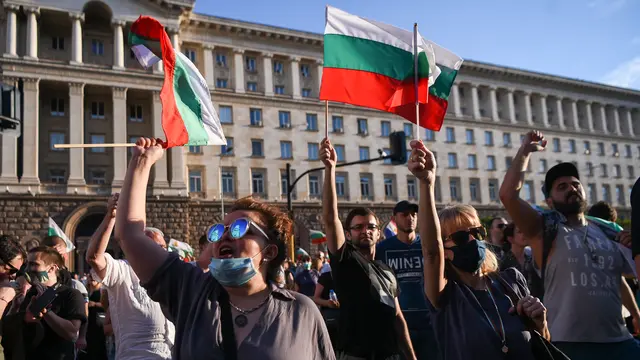
Protesters have gathered in central Sofia. AFP/Nikolay Doychinov
Bulgaria is facing a political crisis after the country's president called on the government to step down and the chief prosecutor to resign to alleviate the growing tensions that have sparked protests in the country.
President Ruman Radev said, Saturday, in a nationally televised address that "Bulgarians of different ages and political affiliations are demanding the restoration of the rule of law and basic civil freedoms that have been methodically violated over the last years."
"The anger is deep. It has been piling up for years and cannot be suppressed by fear and force."
An ex-commander in the Bulgarian air force, Radev was elected in 2016 with the votes of the centre-left, Socialist Party. During his term Radev has been a vocal critic of Prime Minister Boyko Borissov's government, accusing it of corruption and suppressing freedom of speech.
On Saturday, thousands of people went out on the streets of the capital, Sofia, to demand the resignation of the prime minister and chief prosecutor Ivan Gechev, accusing them of corruption and links to criminal groups.
The protests were sparked earlier this week after Geshev ordered raids of the president's headquarters and the arrests of two of his aides - his legal affairs and anti-corruption secretary and his security and defence advisor were detained for questioning and their offices searched as part of two separate probes into influence-peddling and disclosure of state secrets.
On Saturday, protesters gathered in Sofia and chanted "mafia" and "resign" and accused the government and Geshev of delaying corruption investigations.
Borissov's GERB party, which remains the country's most popular according to opinion polls, has accused Radev of stoking a political crisis.
"We have done so much already, we have made so much efforts, nothing is keeping us in office except for responsibility," the prime minister posted on his Facebook page.
Geshev and Radev have a long-standing relationship steeped in animosity. The prosecutor's initial appointment in 2019 was vetoed by Radev, only passing following a second vote in the Supreme Judicial Council, which the president was constitutionally required to ratify.
Bulgaria has a history of anti-corruption protests, including under Borissov's rule - the incumbent is running his third government having been the prime minister from 2009 to 2013, and from 2014 to January 2017.
The country has been subject to an EU corruption monitoring program since it joined the union in 2007,
although the European Commission last year praised the steps taken to tackle the issue.
Source(s): AP ,AFP
 简体中文
简体中文





